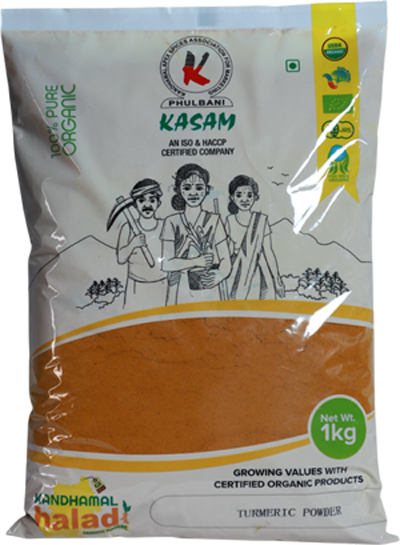
A virtual assistant collects the products from your list

The bounties of nature have blessed this area with a congenial agro-climatic condition for cultivation of various spices mainly turmeric, ginger, mustard and tamarind etc. The turmeric is the main cash crop of the tribals, which is being grown from time immemorial. The following statement of Mr. L. S. S. O. Mally (Annual District Gezzettier 1908) indicates the ancientness of turmeric, cultivated by the tribals.
“The growth of turmeric is almost a religious rite with these wild people and it was to improve its colour and output that human sacrifices used to be performed. It is their chief source of income as they export it in large quantities, bartering it for grain and salt to drivers of pack-bullocks who come from Ganjam, Sambalpur, Puri and tributary states”.
Annually about 12710hct of turmeric is grown in the district with a production of about 24000MT (Dry). Kandhamal stands 2nd in the district wise coverage of turmeric in the country next to Karimnagar district of Andhra Pradesh. About 3550MT of ginger is produced from about 2090hct of area. In ginger production as a district it occupies 4th position in the country.
The local turmeric predominantly grown by the tribals contains 2 to 3% curcumin, 12.15% oleoresin and 5.33% volatile oil. Its keeping quality is very good and the aroma is very prominent. The improved variety of turmeric introduced recently contains 4 to 5% curcumin, 10 to 15% oleoresin and 2 to 4% volatile oil. About 1400hct of land is covered with improved variety of turmeric and has about 3000MT of production.
As has been indicated earlier the tribals of the district are backward both economically and educationally. They are following the primitive and traditional methods of cultivation without application of fertilizer or pesticide. It will not be out of place to discuss in nut cell the actual organic method of cultivation of spices specially turmeric and ginger.
Ginger and turmeric are generally cultivated in the uplands, hill slopes and even on hilltops where shifting cultivation (“Podu”) is practiced. They never grow turmeric and ginger in the same plot continuously. Generally after one or two years of fallow, these crops are again grown. This type of crop rotation helps them to minimize the soil borne diseases.
The land is ploughed at the break of pre-monsoon shower and at the break of monsoon; seeds are sown behind the plough in the 2nd fortnight of May to 1st fortnight of June depending on the rainfall. These spices are grown under rainfall conditions. Companion crops like arhar, colocasia and cowpea are grown with these spices.
No fertilizer or pesticides are added to the soil. After seeds are sown, the entire plot is mulched with dry leaves of Sal plant (soheria robusta) to a thickness of 5 to 10cms, which helps the crop in
One manual weeding is done to check further weed growth. All these method of cultivation implies that these spices are grown by default or under compulsion as Organic.
Observing this method of cultivation by these tribals, the Honorable Chairman Spices Board during his august visit to the area has opined that inorganic farmers feel proud for their progress but in the present scenario they will stand behind these tribals who are practicing organic farming in default.
KASAM (Kandhamal Apex Spices Association for Marketing) is an apex body of 61 Spices Development Societies comprising more than 12,000 organic farmers spread over 5 blocks (Phiringia, K. Nuagaon, Daringibadi, Raikia & G. Udayagiri) of Kandhamal District which is centrally located having more than 70% SC and ST population. The farmers since time immemorial have been engaged in cultivation of different crops viz:- Turmeric, Ginger, Mustard, Maize, Rice, Black gram, Sesame, Niger etc without using any fertilizer and pesticide. They are organic by default. In true sense they are the ‘Care taker of Mother Earth’.
To highlight this hidden treasure, KASAM formed in the year 1998 under the President ship of District Collector and took up export marketing of the organic produce of the farmers since 2000. KASAM is certifying the area as organic through APEDA accredited agency. Since very 1st year of entry in to marketing, KASAM has been able to export the value added products to different countries through various exporters.
Our motto is upliftment of the socio economic conditions of the poor farmers through minimization of exploitation by traders and by paying proper value for their product at their doorsteps.
KASAM is maintaining its processing center for production of quality, hygienic value added organic products and in the process provides employment to the local people. So purchase of KASAM products is a direct help to the people. In the year 2016-17 one project namely “Modernization and Expansion of KASAM” has been implemented under RKVY in which the old factory is now fully equipped with new machineries & building to increase the processing capacity from 2000MT to 5000MT per annum.
From the beginning KASAM’s work was restricted to 5 Block out of 12 Block of Kandhamal District but from the year 2017-18 with the help of Central scheme “Paramparagat Krishi Vikash Yojana” (PKVY) & in the year 2022-23 “Bharatiya Prakritik Krishi Paddhati” (BPKP) the expansion process of rest 7 Blocks of Kandhamal District is going on and soon it will cover all the 12 Block of the District.
Due to its inherent potential Kandhamal District can be converted to an Organic District in future and efforts in this regards has already been initiated from all concerned stake holders. If carried out properly it will be a dream come true for our District through sincere and dedicated efforts with KASAM leading the way.